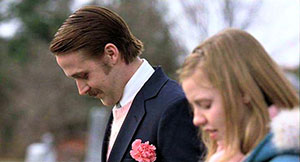
Some writers don’t believe in character arcs because they say that people don’t really change. But, in almost all of the great movie endings the hero at the climax displays a very significant transformation. They are able to do in Act 3 what they could not have done in Act 1 and this shift seems to be fundamental if you want to profoundly move your audience. (And, again, I remind you that when I say “profoundly move”, I mean move to tears.)
In Dead Poets Society, the meek and mild Todd (Ethan Hawke) we meet in Act 1 would not have contemplated taking the stand that he does in Act 3.
In the first hour of Schindler’s List, the amoral opportunist Oskar Schindler would not have given up his fortune for a bunch of Jews.
In the first act of One Flew Over the Cuckoo’s Nest, the charismatic but self-centred R.P. McMurphy would not have chosen to remain in the mental institution to care for the stricken Billy when that window lay tantalisingly open.
At the beginning of The Lives of Others, the Stasi hard-liner Wiesler would not have risked his career or compromised his ideals by aiding and abetting the seditious playwright.
When we first meet Scott in Strictly Ballroom, he would not have done anything that diminished his chances of winning the Pan Pacific championships.
The preternaturally shy man we see lurking in the shadows in the opening scene of Lars and the Real Girl would not have asked Margo to go for a walk as he ultimately does 90 mins later.
The Walt we meet at the start of Gran Torino would choke at the idea of laying down his life in the defence of some “Gook”.
And the geeky Luke Skywalker of Star Wars Act 1 would not have have pushed aside the computer controls and trusted his instincts as he later does at the critical moment in Act 3.
So the hero in all of these profoundly moving films undergoes a very significant transformation. Coincidence?
What happens if the hero doesn’t undergo this transformation? Well, I would say that very often the film tends to make a lot of money.
Takes Raiders of the Lost Ark, for example.
Indiana Jones is not transformed in the hugely successful and thoroughly entertaining Raiders. He is able to prevail at the climax by using knowledge rather than character and it’s knowledge that he had in Act 1. I see a comment that says that Indiana “learns” to value relationships over his archeological adventures. I’m afraid I can’t agree. For a character to learn anything in a film, that learning needs to demonstrated and dramatised. And in Raiders, he’s not forced to demonstrate that learning. He is able to go after Marion and the Ark – he’s not forced to choose, as I pointed out in the last post. I am not saying that this is a bad ending or a wrong choice by the writers, but the absence of a dramatised transformation is one of the reasons the ending of Raiders is solid and provides a cathartic release, but it’s not, in my opinion, profoundly moving.
The characters in all of the major franchises (Batman, Superman, Iron Man, etc) tend not be transformed which might seem like a compelling reason not to have your hero undergo transformation.
But, if your character is unaltered by the story, I would say that it is very difficult to profoundly move us at the climax. Simply resolving the dramatic tension that started in Act 1 just does not seem to work our emotions sufficiently to really touch us. I would contend – on the basis of the enduring film endings – that only when we see a character do something in Act 3 that they could not have done in Act 1 will we be moved to tears.
Why do the great endings seem to depend to an extraordinary extent on this character transformation?
I think it’s because we know how hard it is to change. We know how easy it would have been to stay as we were, to accept the way the world sees us, to take the selfish option, the one that requires nothing of us. And we like to be reminded that, as humans, we are capable of change, of overcoming our fears and drawing on our higher selves.
But is transformation true to life? Yes, it is.
And will any transformation do? No, it won’t.
I’ll explain more in my next post …
Great Endings Step 5: What sort of transformation moves us?
Earlier posts in the Great Endings series
10 Steps to a Great Movie Ending
Great Endings Step 1: Hero Shouldn’t Get What They Wanted
Great Endings Step 2: Hero should get something more valuable
Great Endings Step 3: Hero should face difficult choice at climax
Join the Cracking Yarns mailing list
Learn about our Screenwriting Courses
Learn about our Online Screenwriting Courses
Learn about our Free Screenwriting Webinars
Learn about our Script Assessment options
Subscribe to the Cracking Yarns YouTube channel